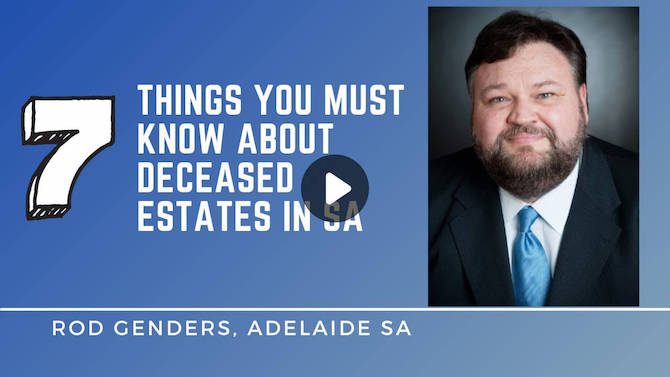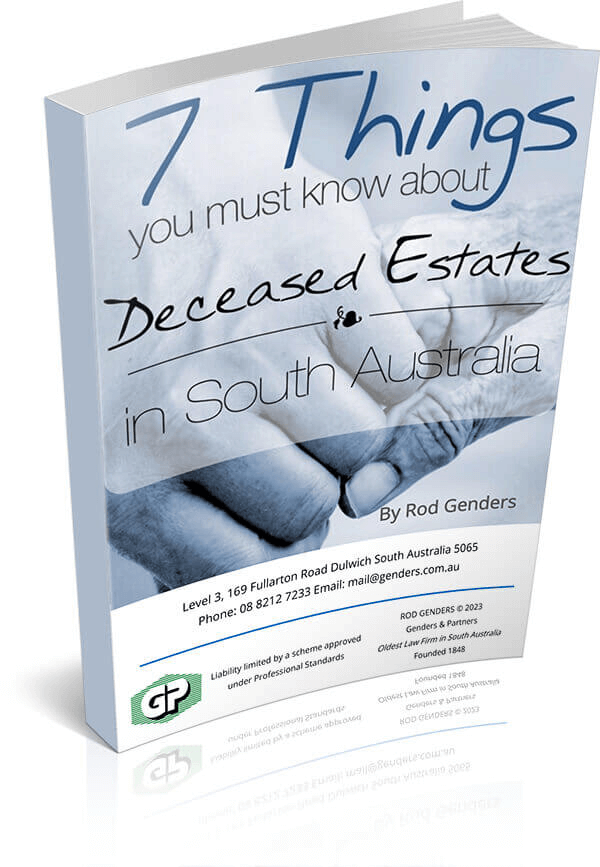
Some misinformed people choose to believe that administering a deceased estate is simple and easy, and therefore they think that they can save the estate some money by doing it themselves, without a specialist lawyer to assist them.
Those people don’t realise that for the executor of the Will of a deceased person in South Australia, DIY means taking all the risk upon themselves for no reward.
(With only rare exceptions, executors are not entitled to charge for their work to administer a deceased estate).
It is very easy to get into trouble when administering a deceased estate, if you don’t know what you are doing.
And like many complicated areas of law, a little knowledge can be a dangerous thing.
Here a few examples of problems that can bite the unwary DIY executor.
#1. Failing to publicly disclose and value all assets and liabilities
South Australia maintains both civil and criminal penalties for executors who fail to publicly disclose and value all assets and liabilities of the deceased person as an integral part of the probate process.
This means that an executor must do their due diligence to locate, identify, describe and value all assets, and retain documentary evidence of their attempts to do so.
Failure to do so will paint a target on them for any creditors or predators of the estate, making the executors personally liable to make good any losses AND risk criminal prosecution.
Making assumptions, taking shortcuts or guessing about these items can land you in hot water.
Often the executor is encouraged (bullied, harassed) by beneficiaries eager to get their inheritance as quickly as possible.
Of course the beneficiaries stand to gain all the benefit, but won’t be the ones with their name on the Court documents, nor will they get into trouble when things turn bad.
That all gets sheeted home to the well-meaning (but naïve) executor who thought they were doing the right thing, only to discover too late that they should have given more thought to protecting themselves and their own assets before embarking upon this high-stakes legal process.
#2. Failing to treat ALL beneficiaries fairly
Although an executor has some discretion in administering the estate, they have a fiduciary duty to settle and distribute the estate fairly, promptly and efficiently for the best interests of ALL the beneficiaries, not just some of them.
An executor who prioritises their own interest ahead of their duty to act fairly and impartially for the good of the estate overall, is risking Court action and costs penalties against them, and possibly even civil & criminal sanctions.
For further information, you might like to read our article: https://www.genders.com.au/rogue-executors/
#3. Not disclosing and dealing with the Deceased’s debts
What if the Deceased had debts?
All estate debts and liabilities must be publicly disclosed to the Court as part of the probate process.
It is also essential for an executor to recognise that estate debts must be paid in priority to beneficiaries receiving their gifts under the Will.
Of course this is subject to the precise wording in the Will, which can sometimes be tricky.
For example the gift of a house property to a specific beneficiary might be subject to the prior payment of any encumbrances and mortgages out of general estate funds.
For further information, you might like to read our article: https://www.genders.com.au/what-to-do-when-someone-dies-with-debts/
#4. Not advertising for creditors or claimants
Although there is no requirement in South Australia to advertise for creditors, it is generally advisable to do so in order to enjoy the protection afforded to estate executors and trustees by s.
29 of the Trustee Act 1929 (SA).
Section 29 provides that upon the expiration of due notice to creditors, the estate trustee may proceed to distribute the estate assets, and will not be held personally liable should there be later notice of a claim following such distribution.
The notice does not extinguish the debt, but removes the personal liability of the estate trustee.
For further information, you might like to read our article: https://www.genders.com.au/advertising-for-creditors-or-claimants-of-deceased-estates/
#5. Taking too long to administer a deceased estate
How long does an executor have to settle an estate in South Australia?
The selling of assets must be performed with diligence; in other words as soon as practicable. However it can often take up to one year to distribute an estate.
If an executor does not act diligently, the beneficiaries may complain to the court.
If you take longer than about 12 months, you would want a good excuse to ward-off complaints from impatient beneficiaries and creditors.
If you take longer than 24 months, the Australian Tax Office might have something to say about the delay, and start looking closely into the tax consequences of not administering the estate.
#6. Is it really the Last Will and can you prove it?
One of the main duties of an executor is identify the document which is the Last Will and Testament of the deceased person.
Because (with only rare exceptions_ every new Will automatically revokes all previous Wills, it is essential that the executor is very certain that the document they deliver up to the Court is the Last Will of the deceased. If you get that wrong, you can get into trouble.
As executor you must conduct a thorough and proper search for any Wills made by the deceased and ensure there is no evidence to suggest that a later Will existed.
If you get this wrong, it is possible that a court could exercise its discretion and hold you personally liable for wrongfully distributing the estate.
It is therefore very important when you first start administering an estate that you consider carefully whether any later Will may have existed by making enquiries of the deceased’s relatives, friends and any professional advisors.
What happens if probate has been granted and an asset has been distributed but a new Will is later discovered?
Incorrectly distributed estates cause major complexities.
Before beneficiaries under a newer Will can attempt to recover their entitlements from the personal representatives who distributed an estate incorrectly, first you should ensure that the new Will is, in fact, valid.
Therefore, you should check that the later Will satisfies the formal requirements for a valid Will.
- it must be made by a person who is 18 years old or over
- it must be made voluntarily and without pressure from any other person
- it must be in writing
- it must be signed by the testator in the presence of two or more witnesses present at the same time
- each witness must attest and sign the Will in the presence of the testator
- the testator must have the requisite capacity to make a valid Will at the time the new Will was executed
If you believe the testator did not have the necessary testamentary capacity, you should seek any contemporaneous evidence of the testator’s mental capacity to rebut claims that the Will is valid.
How do you revoke a grant of probate?
If the new Will is valid, either the grantee of the original grant of probate or, if different, the executors named in the later Will should apply to revoke the grant of probate.
At the same time, an application should also be made to take out a new grant in favour of the personal representatives to the later Will.
The applications should be made at the Probate registry from which the grant was originally issued and are made in the form of an affidavit.
The application should set out the details of the first grant, the grounds for revocation (ie that a later Will has been discovered) and the right to the new grant.
If the application is successful, the Probate Registry may then revoke the previous grant of probate on the grounds that the later Will has been discovered and a new grant Will be issued in favour of the personal representatives appointed under the new Will.
Can a beneficiary bring a claim against you if you distributed an estate incorrectly?
The primary claim of a beneficiary under the new Will is likely to be against the original personal representative (executor) who wrongly distributed the estate.
The general principle is that personal representatives who have distributed the assets of the deceased are personally liable to any beneficiaries if an incorrect distribution has been made, even if the personal representatives were unaware of the mistake.
It may also be possible for a beneficiary to make a claim against the wrongful recipients of the assets of the estate.
Indeed, as a personal representative, you may be able to recover the monies or asset from the wrongful recipient.
For a wrongful recipient to be found liable in such claims is a question of whether the recipient received the assets in good faith and if it would be unconscionable for him or her to keep the assets.
What is the difference between personal claims and proprietary claims?
A personal claim can be made against a personal representative or wrongful recipient for compensation of the amount owed to the beneficiary under the new Will.
Such claims may be subject to a limitation period running from the date on which the right to receive the estate accrued, depending on the jurisdiction of the original Grant.
It may be possible to make a proprietary claim, whereby the beneficiary seeks to recover property or a specific asset from the personal representatives (if they are still holding the assets) or the wrongful recipient instead of monetary compensation.
In practice, it can be very difficult for a beneficiary to recover assets in this way, particularly if the asset in question has been sold and the proceeds have been mixed with the other assets of the recipient.
Summary
If you are named as an executor in the Will of a deceased person, ask yourself if it is truly worth the substantial risk to your own assets and peace-of-mind to attempt to DIY this complex task of administering a deceased estate.
You can avoid or minimise much of the risk and stress by employing a senior experienced lawyer who specialises in Wills and estates, to advise you and perform much of the heavy-lifting for you.
Contact the oldest law firm on South Australia – Genders and Partners, established 1848 – to learn more about retirement planning, superannuation, estate-planning and estate-administration solutions, by visiting our website today and schedule a free no obligation telephone consultation to find out how we can help you and yours.
Remember – any mistakes you make in administering the estate won’t become apparent until after you’ve made them and exposed your own assets (and family) to the risk of litigation. Get proper advice, and do it right.
To learn how to protect yourself, your family and your assets, and efficiently and quickly administer the deceased estate of a loved one, claim your FREE 15 minute Telephone Consultation









